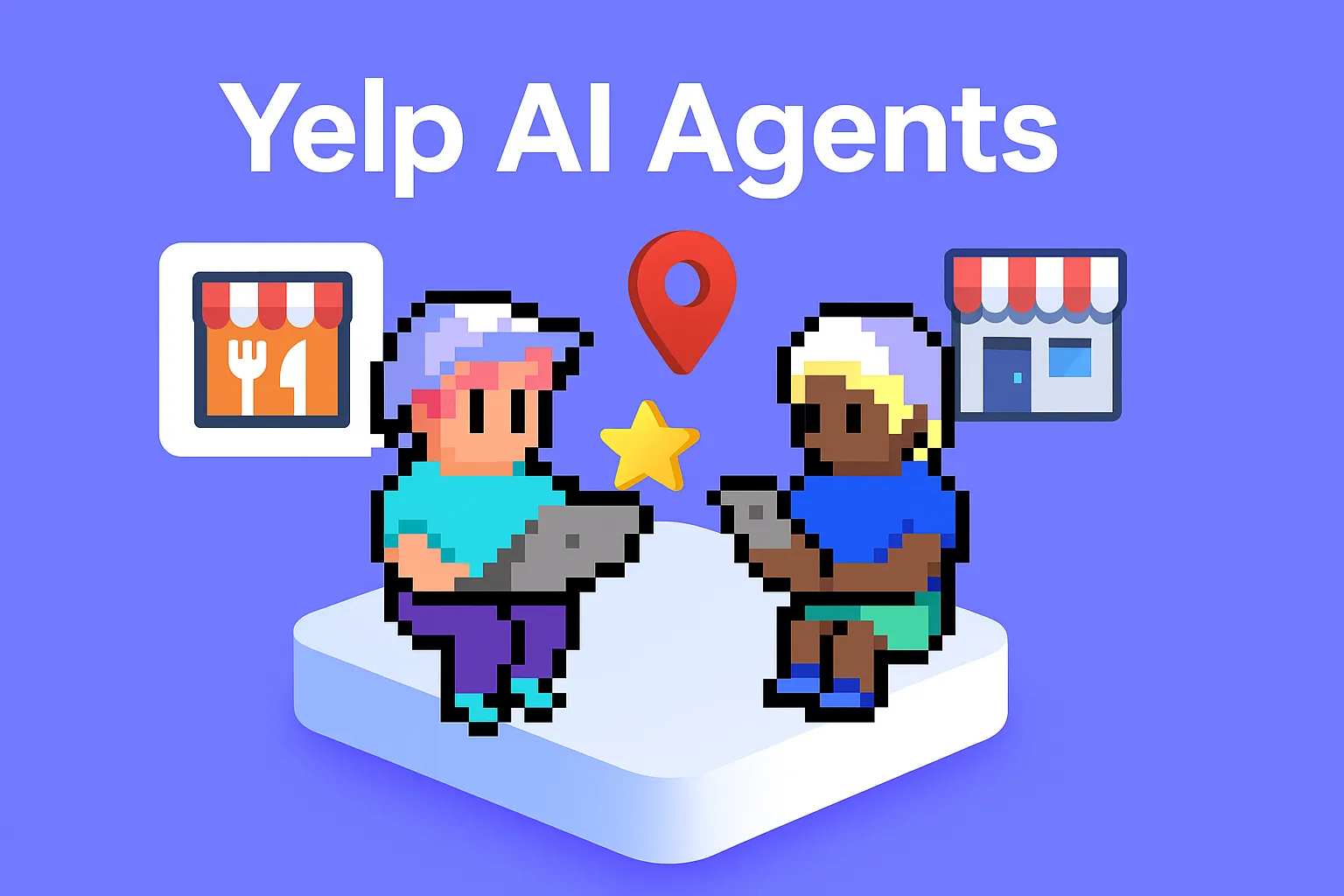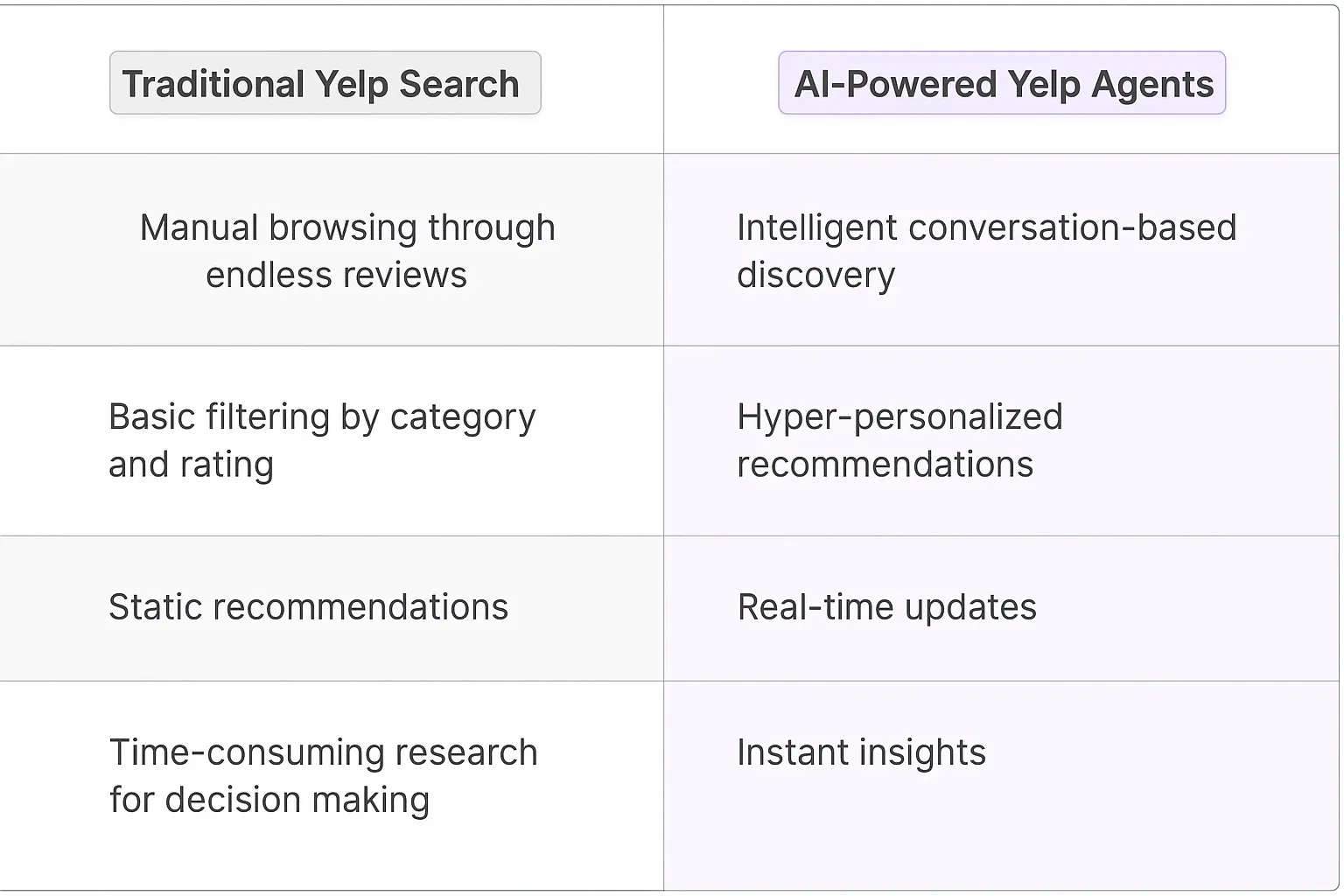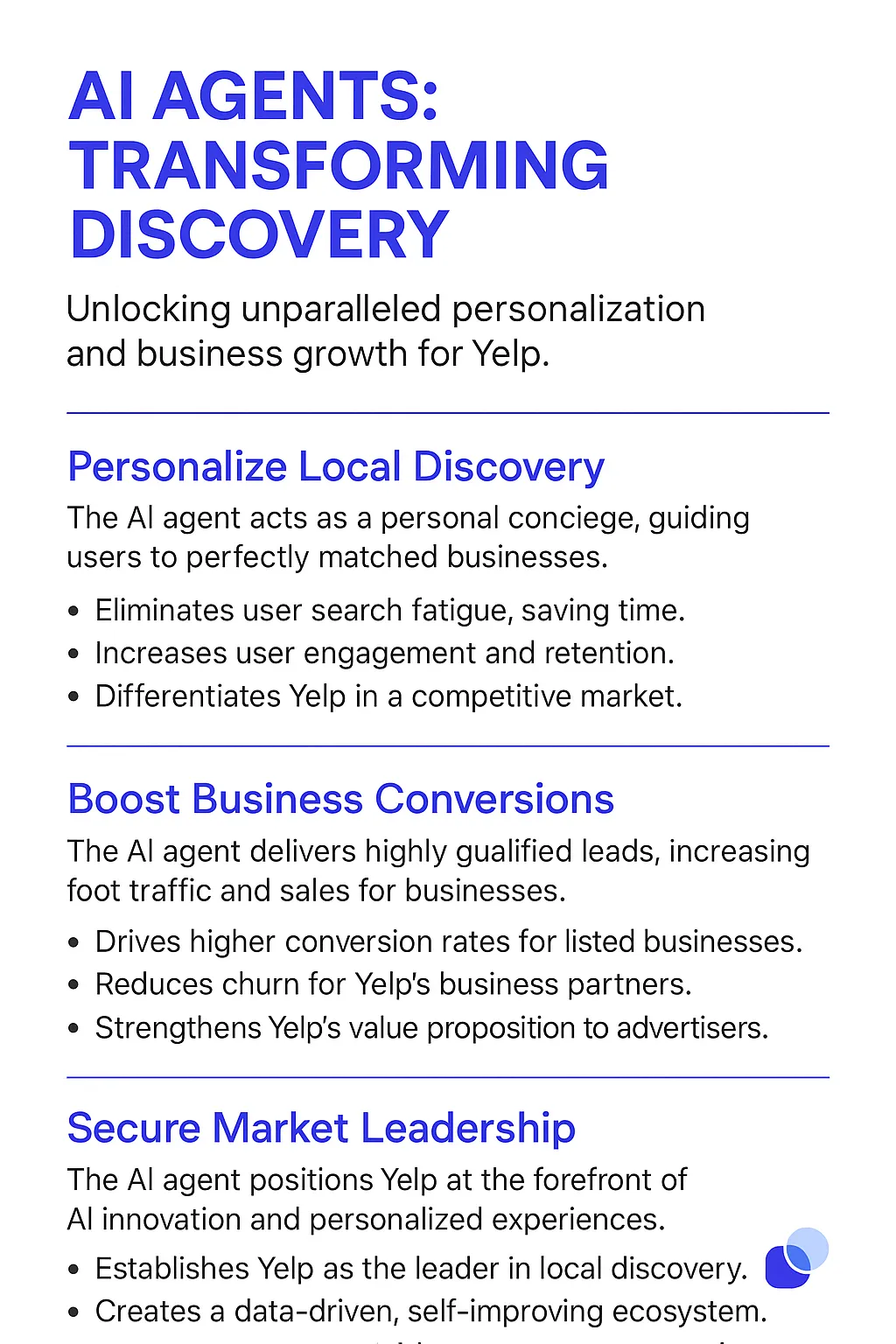Yelp AI Agents
Understanding Yelp
Yelp is a crowd-sourced review platform that connects people with great local businesses. It's the go-to app for finding everything from the best tacos in town to reliable plumbers. Users contribute reviews, ratings, and photos, creating a rich tapestry of local knowledge. But Yelp isn't just a passive directory - it's a living, breathing ecosystem of consumer experiences and business interactions.
Yelp's core features include user-generated reviews, business listings, and a search function that helps users find local services. The platform also offers check-ins, reservations, and a Q&A section for businesses. What sets Yelp apart is its focus on community - it's not just about ratings, but about the stories and experiences behind them.
Now, with AI agents entering the scene, Yelp is leveling up these features. These digital teammates are working behind the scenes to make recommendations more personalized, search results more relevant, and the overall user experience more seamless. They're not replacing the human element - they're amplifying it, making Yelp smarter and more responsive to user needs.

Benefits of AI Agents for Yelp
What would have been used before AI Agents?
Before AI agents, Yelp relied heavily on human moderators and basic algorithms to manage the vast influx of user-generated content. This approach was slow, inconsistent, and often led to a backlog of reviews waiting for approval. Users had to navigate through clunky search interfaces, often struggling to find relevant recommendations that matched their specific preferences and context.
Customer support was primarily handled through traditional channels like email and phone, resulting in longer wait times and frustration for users seeking quick answers. Business owners had limited tools to engage with their customers and manage their online presence effectively.
What are the benefits of AI Agents?
AI agents are transforming Yelp's ecosystem, creating a more dynamic and personalized experience for users, businesses, and the platform itself. These digital teammates are working behind the scenes to enhance every aspect of the Yelp experience.
For users, AI agents are like having a hyper-intelligent local guide in your pocket. They're analyzing your preferences, location data, and past behavior to serve up eerily accurate recommendations. It's not just about finding a good restaurant anymore; it's about discovering that hidden gem that perfectly matches your vibe and cravings at that exact moment.
On the content moderation front, AI agents are processing reviews at lightning speed, flagging potential issues and maintaining the integrity of the platform. This rapid curation ensures that users always have access to fresh, relevant content without the usual lag time.
For businesses, AI agents are becoming indispensable digital marketing assistants. They're helping owners respond to reviews more effectively, optimize their listings, and even predict customer trends. It's like having a team of data scientists and marketing gurus working around the clock to boost your online presence.
Perhaps most interestingly, AI agents are fostering a new level of engagement between users and businesses. They're facilitating more meaningful interactions by suggesting personalized responses to reviews and helping businesses tailor their offerings based on customer feedback.
The real game-changer is how these AI agents are learning and evolving. Each interaction, each search, each review is feeding into a massive learning system that's constantly refining and improving the Yelp experience. It's creating a virtuous cycle where the platform becomes more valuable and indispensable to both users and businesses with each passing day.
In essence, AI agents are turning Yelp from a static review platform into a living, breathing ecosystem that's constantly adapting to serve its community better. It's not just about finding a place to eat or shop anymore; it's about creating connections and experiences that enrich our daily lives.

Potential Use Cases of AI Agents with Yelp
Processes
Yelp's AI agents could revolutionize how we interact with local businesses and make decisions about where to eat, shop, and hang out. These digital teammates would tap into Yelp's vast database of user reviews, photos, and business information to provide hyper-personalized recommendations and insights.
One key process these AI agents could enhance is the discovery of new places. Instead of scrolling through endless lists or relying on basic filters, users could have a conversation with their Yelp AI. They'd describe their mood, dietary restrictions, or specific cravings, and the AI would curate a list of spots that hit the mark. It's like having a local friend who knows every nook and cranny of the city.
Another process ripe for AI enhancement is trip planning. Imagine telling your Yelp AI about an upcoming weekend getaway. It could craft an itinerary that balances top-rated attractions with hidden gems, factoring in your preferences, budget, and even the weather forecast. This level of personalization at scale is where AI really shines.
Tasks
On a more granular level, Yelp's AI agents could tackle specific tasks that make the user experience smoother and more valuable. Here are a few examples:
- Review summarization: Instead of reading through hundreds of reviews, the AI could distill the key points, highlighting consistent praise or recurring issues.
- Menu analysis: For restaurants, the AI could scan menus and user photos to recommend dishes based on your dietary preferences or past favorites.
- Price comparison: When looking for services like auto repair or home renovation, the AI could analyze pricing data to help you understand if you're getting a fair deal.
- Reservation assistance: The AI could handle the back-and-forth of making reservations, finding available times that work with your schedule and party size.
- Real-time updates: During popular events or busy seasons, the AI could provide live updates on wait times or sudden closures, saving you from wasted trips.
These AI-powered features would transform Yelp from a passive directory into an active, intelligent companion for navigating the world of local businesses. It's not just about finding a place to eat or a service to use; it's about making better decisions faster and discovering experiences you might have otherwise missed.
The potential here is massive. By leveraging AI, Yelp could create a moat of personalized, context-aware recommendations that generic search engines or maps apps can't match. It's the difference between asking a stranger for directions and getting advice from a knowledgeable local friend. This level of AI integration could cement Yelp's position as the go-to platform for local discovery and decision-making.

Industry Use Cases
The versatility of AI agents in Yelp makes them valuable across various industries. Let's dive into some meaty, industry-specific use cases that showcase how AI can transform workflows and processes. These aren't your run-of-the-mill examples; we're talking about AI that's so integrated, it feels like it's been part of the team since day one.
From mom-and-pop shops to Fortune 500 companies, Yelp AI agents are becoming the secret sauce in customer engagement recipes. They're not just answering queries; they're crafting experiences, predicting trends, and sometimes even out-performing their human counterparts in ways that would make a Silicon Valley VC's eyes light up.
So, buckle up. We're about to explore how these digital teammates are rewriting the playbook for industries across the board, creating efficiencies that would make even the most seasoned operations guru do a double-take.
Hospitality Industry: Yelp AI Agents as Digital Concierges
The hospitality industry is ripe for disruption by Yelp AI Agents. These digital teammates could function as always-on, hyper-personalized concierges for hotels and resorts. Think of them as the ultimate local guides, but with access to real-time data and a deep understanding of guest preferences.
Here's where it gets interesting: These AI agents could tap into Yelp's vast database of reviews, ratings, and local business information to create bespoke experiences for each guest. They'd analyze a guest's past behavior, current mood, and stated preferences to suggest the perfect itinerary.
But it's not just about recommendations. These AI agents could handle reservations, coordinate transportation, and even negotiate special deals with local businesses. They'd be constantly learning and improving, becoming more valuable with each interaction.
The real game-changer? Scalability. A single AI agent could simultaneously assist hundreds of guests, providing a level of personalized service that would be impossible with human staff alone. This isn't about replacing human touch – it's about augmenting it, allowing hotel staff to focus on high-value, complex interactions while the AI handles the rest.
From a business perspective, this could lead to increased guest satisfaction, higher spending per stay, and improved operational efficiency. It's a classic example of technology creating a win-win situation for both businesses and consumers.
The potential ripple effects are fascinating to consider. As these AI agents become more sophisticated, they could start influencing local business ecosystems, directing tourist flows, and even shaping urban development. It's not just about enhancing the guest experience – it's about reimagining the entire hospitality industry.
Real Estate: Yelp AI Agents as Neighborhood Insiders
The real estate industry is about to get a serious upgrade with Yelp AI Agents. These digital teammates aren't just glorified search engines - they're neighborhood insiders with an unprecedented grasp of local dynamics.
Think about it: Yelp's database is a goldmine of hyperlocal information. Reviews, ratings, business trends, foot traffic patterns - it's all there. Now, imagine an AI that can parse through this data, combine it with real estate metrics, and deliver insights that even seasoned realtors might miss.
These AI agents could become the ultimate neighborhood profilers. They'd analyze everything from the best coffee shops and schools to crime rates and property value trends. But here's where it gets really interesting: they could predict future hotspots before they blow up.
For buyers, this means getting ahead of the market. For sellers, it's about positioning their property in the most attractive light. And for realtors? It's like having a secret weapon that gives them an edge in every transaction.
But let's take it a step further. These AI agents could create virtual neighborhood tours, pulling in street view data, local event calendars, and even social media sentiment to give potential buyers a real feel for an area without ever setting foot there.
The network effects here are huge. As more people use these AI agents, the data gets richer, the predictions get sharper, and the value proposition becomes irresistible. It's a classic example of AI creating a flywheel effect.
And here's the kicker: this isn't just about making real estate transactions smoother. It's about fundamentally changing how we understand and interact with our communities. These AI agents could influence migration patterns, impact local economies, and even play a role in urban planning.
We're not just talking about a new tool for realtors. We're looking at a potential reshaping of the real estate landscape, driven by AI and powered by the wealth of data Yelp has been accumulating for years. It's a perfect storm of technology and timing - and it's going to be fascinating to watch it unfold.
Considerations and Challenges for Yelp AI Agents
Implementing AI agents for Yelp isn't just about slapping on a chatbot and calling it a day. It's a complex dance of technology, user experience, and business strategy. Let's dive into the nitty-gritty of what it takes to make this work.
Technical Challenges
First up, we're dealing with a massive, ever-changing dataset. Yelp's got millions of reviews, photos, and business listings. Your AI needs to crunch through all that in real-time, and still come out with spot-on recommendations. It's like trying to drink from a fire hose while doing a Rubik's cube.
Then there's the natural language processing (NLP) hurdle. Yelp reviews are a mixed bag of slang, sarcasm, and inside jokes. Your AI needs to be smart enough to parse "This place is the bomb!" as a positive review, not a security threat. It's not just about understanding words; it's about getting context and sentiment right.
Operational Challenges
On the ops side, we're looking at a whole new can of worms. How do you train your AI to handle the inevitable curveballs? Users might ask about anything from vegan options to wheelchair accessibility. Your digital teammate needs to know when it's out of its depth and how to gracefully hand off to a human.
There's also the trust factor. Yelp's bread and butter is user-generated content. How do you make sure your AI isn't inadvertently creating fake reviews or skewing ratings? You need rock-solid safeguards to maintain the integrity of your platform.
User Experience Considerations
Let's talk UX. Your AI agent needs to feel like a natural extension of the Yelp experience, not some bolted-on feature. It should enhance discovery, not replace the joy of stumbling upon a hidden gem. The challenge is striking that balance between helpful and intrusive.
And don't forget personalization. A one-size-fits-all AI is about as useful as a screen door on a submarine. Your agent needs to learn user preferences over time, adapting its recommendations based on past behavior and explicit feedback.
Ethical and Legal Implications
Finally, we've got the ethical minefield. How do you ensure your AI isn't perpetuating biases in reviews or recommendations? There's a fine line between personalization and discrimination that you need to navigate carefully.
On the legal front, you're dealing with a ton of personal data. Your AI needs to be GDPR-compliant, CCPA-friendly, and whatever other alphabet soup of privacy regulations come down the pike. One data breach, and you're looking at a PR nightmare and potential lawsuits.
Implementing AI agents for Yelp is no walk in the park. It's a complex, multifaceted challenge that touches every aspect of the business. But get it right, and you're looking at a game-changer in local discovery and user experience. The key is to approach it with eyes wide open, ready to iterate and adapt as you go.
The Future of Local Discovery: Yelp's AI Revolution
The integration of AI agents into Yelp isn't just a tech upgrade - it's a fundamental shift in how we interact with local businesses and make decisions. These digital teammates are turning Yelp from a static review platform into a dynamic, personalized guide to the best local experiences.
But here's the real kicker: this is just the beginning. As these AI agents learn and evolve, they'll create a flywheel effect. More user interactions lead to better recommendations, which in turn drive more engagement. It's a virtuous cycle that could cement Yelp's position as the go-to platform for local discovery.
We're looking at a future where finding the perfect spot for dinner or the right service provider isn't just easier - it's tailored specifically to you. Yelp's AI agents are set to redefine what it means to be a local guide in the digital age. And for businesses and consumers alike, that's a five-star proposition.













